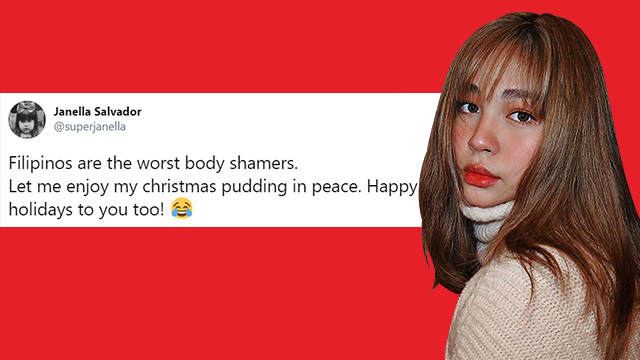
Actress Janella Salvador has articulated the pain of everyone who has parried relatives' half-meant jokes during Christmas reunions: Filipinos have a knack for body-shaming.
At the Noche Buena table, it's "tumaba ka." It doesn't matter if the excess poundage was due to months of quarantine. For the rest of the year, the targets are celebrities who outgrow their swimsuit bodies. It doesn't matter if they've just given birth like Salvador.
[twitter:https://twitter.com/superjanella/status/1342797442539024384?s=20]
How many offensive Tagalog words are there for fat? Tabachoy, lumba-lumba, dabiana, baboy. How about slim? What else aside from payat? Language confirms it. Filipinos are wired to be pintasero/pintasera.
"Social media heightened ang isang ugali, lalong-lalo na ng mga Pilipino. Ang Pilipino may kuyog mentality. Pag may nahuling magnanakaw, lahat gustong maki-bugbog. Sa social media nagba-bandwagon effect," said Nestor Castro, a cultural anthropolgist from the University of the Philippines in Diliman.
Why do Filipinos body-shame?
For centuries, Filipinos have had this stereotype for beauty—fair skin, a trim waist and a flat tummy. Anything that goes outside of it can be considered ugly, Castro told reportr.
[instagram:https://ift.tt/37Znq2E]
Angel Locsin was her generation's Darna, the super-heroine who vanquishes monsters and criminals while wearing a bright red bikini. She still gets bashed for her frame, no matter if she has proven to be a heroine to those in need in real life. It doesn't matter if those who criticize her never achieved the type of figure she once did.
"Very, very seldom na may makikita ka na nagpe-praise ng may kalakihan ng katawan. Dahil sa kine-create na imahe," Castro said.
"Pinaka-vulnerable sa body-shaming activities ang celebrities kasi may pino-project sila na image. Napapanood sila sa TV, sa fashion magazines na nagco-conform sa kung ano ang tingin ng society is sexy or beautiful," he said. "Pag nag-defy na sila doon, doon na sila binabansagang lumba-lumba."
What is the role of social media?
Filipinos make sure they have their best lives on display on Facebook and Instagram to avoid getting body-shamed or criticized, Castro said.
That's why those who gained some poundage during the quarantine hide in black shirts or take selfies only from the breast up. This holiday season, Christmas trees and gifts provide convenient camouflage for quarantine bellies.
"Mas madaming oras ang tao, mas madaling mag-online. Wala silang pinagkakaabalahan. Kahit work from home, wala naman nakakabanatay," Castro said.
That's the toll of being told for generations that being fat or ugly is shameful, Castro said. Remember how comedians during the slapstick era were named after what society perceived as their flaws? Like the late Palito and Babalu.
It's called cultural emphasis, said Castro. Tagalog only has two words for something that smells good: mabango and mahalimuyak. For foul odor there's a list, especially if the stench is from the armpits: putok, anghit.
Will the body-shaming ever end?
There are signs that Filipinos are shaking off the pintasero culture. For a time, makers of whitening lotions faced scrutiny on Facebook and skin whitening soon evolved to skin brightening.
"Nauuna na yung sa skin color. Mas nahuhuli yung sa body shaming kasi ang kalaban mo diyan the establishment—mga nagbebenta ng diet at gym."
Celebrities are also challenging the status quo. In 2018, women-led organization She Talks Asia headed by Iza Calzado, Vicky Herrera, Lynn Pinugu, Sarah Meier, and Bianca Gonzales organized The Body Love Revolution, a conference that aimed to promote body positivity, particularly among women.
[instagram:https://ift.tt/38Nf5hP]
Still, the journey to promoting love of one's body still has a long way to go, particularly here in the Philippines.
"Lahat naman ng cultures nagbabago. Hindi ko masasabi na mapanlait na tayo forever and ever," Castro said. "Dapat, on guard tayo sa mga gusto natin baguhin, ito ay magagawa through education, formal and non-formal, positive images."
Hey, Spotters! Check us out on Viber to join our Community and subscribe to our Chatbot.
Source: Spot PH
No comments:
Post a Comment